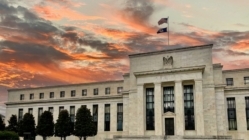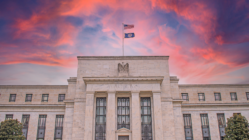
Goldman Sachs recently lowered its recession prediction to a probability of only 25%!
This of course is in sharp contrast to Jeff Snider, Barry Habib, Alf Peccatiello, Stephanie Pomboy, Hugh Hendry and many other analysts who believe a recession is all but certain.
So, why would Goldman Sachs, with all of its talent, money, data, power, and connections have such a different outlook? A) They might be missing something that the other analysts are seeing or vice versa; B) Goldman is very politically connected, and they might simply be projecting more optimism at the behest of the current administration; or C) The Goldman Sachs poohbahs are so wealthy and removed from regular society that they are missing many of the unusual indicators that the rest of us see daily.
And here are a few of those unusual recession indicators:
- The Car Wash Indicator. I have blogged about this a few times, as the Danville, CA car wash has always been a very reliable indicator. BUT – now I am relying on the Plano, TX car wash indicator, as there are two very high-end car washes near my home. Both were always packed every time I went to either of them, with long lines and wait times. BUT – the last two times I have gone, there were no lines or wait times at all, and one of them was shockingly quiet. Interesting sidebar: In CA, the fancy cars getting washed are very high-end SUVs and sedans, while in TX the fancy vehicles consist of almost entirely of $90,000, 4-door, short-bed pickup trucks.
- RV Sales. This is a proven indicator, as RV sales and prices surge during good times and invariably crash prior to and during recessions. And – according to this article, we are in the midst of a brutal crash. I suspect that very few Goldman execs follow the RV market though.
The next 8 items were borrowed verbatim from this PCBB Article: 8 Quirky Indicators of a Recession
- Lipstick sales surge. The “lipstick effect,” a fairly well-known theory put forward by economist and sociologist Juliet B. Schor, says that people buy more lipstick during an economic downturn when they can’t afford more expensive beauty products. The lipstick effect was a reliable barometer during the post-9/11 recession, when Estée Lauder reported an uptick in lipstick sales.
- Men’s underwear sales stagnate. Former Federal Reserve Chair Alan Greenspan hypothesized that when times are hard, people wait longer to replace worn-out items. Men’s underwear, typically utilitarian and hidden from view, is a prime candidate for slower replacement when shoppers feel a financial pinch. According to the newspaper, The Guardian, the men’s underwear market sagged in 2002 and Hanesbrands stock lost 50% of its price YoY.
- Tipping decreases. Exotic dancers supposedly get better tips when times are good; their earnings plunge when times are hard. A dancer quoted in The Guardian says that her income was down by half in December YoY, and heard similar stories from dancers in Vegas. “They’re like the oracles we consult,” she says. “If Vegas girls aren’t making money, no one’s making money.” There is a big tipping backlash in general now too.
- Dating habits change. Online dating apps perform well when singles have less money to spend. Instead of spending money at bars and clubs, where they might meet eligible counterparts, daters go online to meet when they’re pinching pennies. In November 2022, Match Group, which owns Tinder and Hinge, saw a 2% increase in paying subscribers.
- Hair salon services decrease. More people rock their natural hair color during an economic slump. Expect to see fewer adults with platinum-blond hair or obvious dye jobs, and more people wearing their natural dark or grey shades. It’s hard to justify spending $200 a month or more to maintain a salon-quality dye treatment in a recession.
- Company fridges fill up. More packed lunches appear in office refrigerators when hungry people don’t have room in their budgets for restaurant meals. By contrast, restaurants do better when people have more money to spend on eating out.
- Luxury watch sales decline. In good economic times, firms that pay employees bonuses issue bigger bonuses. That in turn drives up Rolex sales. It’s mostly middle-aged men who buy these and other expensive watches when they reach a professional level that lets them afford the purchase, but luxury watch sales decline during economic downturns. Swiss Watch Exports to US Suffer First Drop in Two Years
- An American Football Conference team wins the Super Bowl. According to this (unscientific) idea, when a team from the American Football Conference (AFC) wins the Super Bowl, the stock market will decline in the coming year. A win for the National Football Conference team, on the other hand, predicts a bull run in the upcoming year. This indicator has no discernable connection to the economy, but it has been correct 41 out of 56 times as of the end of 2022: a success rate of about 73%. The Kansas City Chiefs, winners of the most recent Super Bowl, are part of the AFC.
AND – here are a few more “quirky recession indicators.
- Ads for the Marine Corps. When the economy is bad, the Marines can market their brutal conditioning and people will still enlist. But, when the economy is good, the Marines have to sell themselves as happy, polished, and positive.
- Necktie (and all clothing) styles get more conservative during recessions, as employees who are at risk of losing their jobs don’t want to take any chances.
- Petnapping increases during recessions, as stolen pets are a lot cheaper 😊 . There are also rewards to be had for returning stolen pets.
- Bar sales plummet during recessions. It is interesting to note though that this time may be different because young people have more disposable income because of increased wages for entry-level jobs (retail, service, etc.).
- Cardboard box sales plummet during recessions, as boxes are used for both retail stocking and online shipping. Cardboard Box Sales To Remain Low in 2023
- Crayon sales plummet during recessions because restaurants are less likely to dole them out to kids.
- Big Mac sales surge during recessions as consumers look for cheaper dining out options.
In any case, while Snider, Pomboy, Goldman Sachs, and others look at unemployment claims, yield curves, inventory builds, inflation data, banking problems, consumer sentiment surveys, trade data, and more, all of us normal people can just look at normal things and probably gage the economy as well as anyone.
And right now, car washes, RV sales, and the Kansas City Chiefs are screaming recession!
Jay Voorhees
Founder | JVM Lending
(855) 855-4491 | DRE# 1197176, NMLS# 310167
























